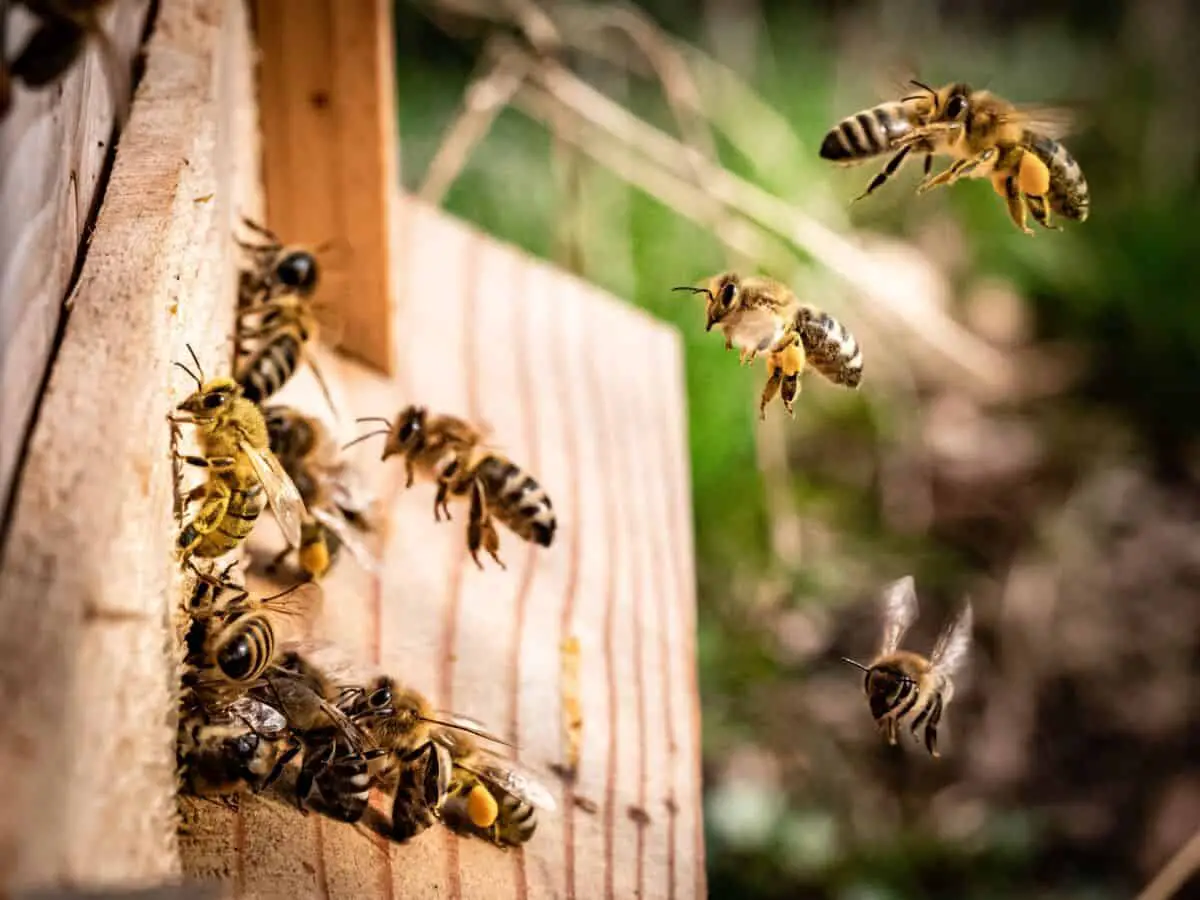During spring and summer, you may want to relax on your balcony as you sip on a cool beverage or catch up on your reading. But if you have bees buzzing around, it not just ruins the experience, the insects could also prove dangerous, especially if you’re allergic to insect bites.
To keep bees away from your balcony, keep the area well-maintained and clutter-free. Avoid growing bright-colored plants. Wear dark clothing and avoid perfume when spending time outside. Use natural bee repellents or make your own bee catcher. Also, switch off the balcony lights at night.
To keep bees away from your balcony, you must first identify what attracts them to your place and take measures to remove those hot spots. Understanding what bees find repelling would also help keep the bees at bay. Read on to learn tips and tricks to keep bees away.
1. Keep the Balcony Clean and Dry
Take a hard look at your balcony space and identify the objects that need not be there. Remove all unused materials such as old and unused pipes and hoses, empty buckets, empty pots. Bees are attracted to water, so make sure there’s no water spilled anywhere. Keep the balcony clean and dry at all times.
If you have potted plants in the balcony, ensure the soil in the pot is well-drained. Excess moisture will also attract bees flying in search of water during summers.
Check for holes in the wall, ceiling, eaves, overhangs, and other structures in the balcony. A hole as small as 1/3 cm (1/8 inch) is good enough for bees to enter and make it their home. Seal any gaps you find using caulk, silicone, a metal screen, or expanding foam.
If you have had a beehive in your balcony in the past, make sure it is completely removed. Even a tiny scrap of an old hive will attract new bees to the spot. If you find any remnants of old hives, get professional help to clear them and do a thorough cleaning of the area.
2. Avoid Colored Plants in the Balcony
Bees feed on the nectar and pollen of flowers. Bright flowers in hues of white, violet, blue and yellow are the most attractive to bees. Having potted plants with flowers in these colors is a sure way to invite bees home.
If you live in or near a bee zone, it’s highly advised you avoid keeping potted plants in your balcony. But if you can’t do without plants, you can keep basil, mint, eucalyptus, or pennyroyal because these produce strong, anti-bee scents.
3. Use Essential Oils
Wipe down balcony surfaces with any essential oil such as peppermint, lavender, lemongrass, thyme, fennel, or hyssop oil. Soak cotton balls in the oil and place them at the corners of your balcony.
If you have young children at home and fear they may mistake these cotton balls for candy, mix the oil with some water, pour the mix in a spray bottle, and spray the solution around the balcony instead.
4. Try Natural Bee Repellents
Raid your kitchen cabinets for any of the following natural bee repellents:
- Vinegar: Vinegar is an excellent bee repellent. If you don’t have it at home, the 30% Pure Vinegar – Home & Garden by Green Gobbler will be ideal. Pour the vinegar in small containers and place a few of them around the balcony.
- Cinnamon: Powder some cinnamon and sprinkle it around the balcony. Cinnamon’s strong smell is a deterrent to bees.
- Cucumber peels: Place cucumber peels by the balcony edges or along the walls or on the soil in your pots. The acidic nature of these peels repels bees.
- Garlic: Peel a few garlic cloves, add them to water, and boil. When the mixture cools, strain and pour it into a spray bottle and spritz it around the balcony at regular intervals. The smell of the garlic will keep bees away.
- Spicy peppers: Chop a spicy pepper such as jalapeno, boil it in water, and strain. Pour the liquid into a spray bottle and spray the same around the balcony. Peppers contain compounds that work as a bee repellent.
5. Use Citronella
Grow citronella in pots placed at strategic positions. The pervasive smell of this herb will keep the bees away. But make sure the soil is well-drained so that the plant grows as it should.
If you don’t fancy pots in the balcony, you could burn citronella candles, which are just as effective at repelling bees. The Repel Insect Repellent Citronella Candle is worth consideration for the job.
6. Wear Dark Clothing
Wear clothes in darker shades and avoid yellows and whites when you plan to sit outside. Most flowers are yellow and white, and these bright colors attract bees. When you wear clothing that mimics their appearance, the bees could mistake you for a flower.
7. Avoid Perfume and Use Peppermint Oil Instead
Avoid wearing perfume and body deodorants if you’re going to spend time on the balcony. Fragrances, especially the ones similar to floral scents, attract bees. Also, do not head to the balcony right after you’ve washed your hair with a strong-smelling shampoo.
Peppermint oil is a safe, natural bee repellent. Apply peppermint oil to exposed parts of your body or on your clothing when you are outdoors.
8. Keep the Balcony Dark
Like moths, bees exhibit a positive phototactic reaction, which is a fancy way of saying that they are strongly attracted to bright lights. Switch off the balcony lights at night, and the bees (and moths) will stay away.
9. Make a DIY Bee Catcher
Different types of bee catchers are available in the market. But you can also make one at home using the following items:
- Maple syrup
- Water
- Scissors
- 2-liter soda bottle
To create your own bee catcher, follow these steps:
- Cut the soda bottle head at the end of the slope.
- Put the head back into the bottle in an upside-down position.
- Mix a little maple syrup with water and pour just enough of this mixture to cover the bottom of the bottle.
This should help create a funnel-like entrance through which the bees can enter the bottle or “trap” but cannot escape until you want them to.
Watch this video if you are not sure about the cutting part:
Because there’s very little liquid inside your DIY bee catcher, the bees only get trapped – they do not die. This means you can release them later a safe distance away from your house. This bee trap is an environment-friendly way to deal with the “bee problem.”
Conclusion
Generally, people are tempted to use chemicals or electric zappers to kill bees, as they take less effort and get the job done quickly. Killing bees is not advisable, however.
Bees are integral to the earth’s ecosystem, as they play a vital role in the food chain by feeding on nectar from flowers and helping in pollination. They also produce honey and wax. By killing bees, you are, in some way, hurting the environment.
However, that does not mean you allow bees to become a part of your breathing space. Bee stings can be painful, and the venom they contain could pose serious medical problems.
By identifying what attracts bees and keeping them at bay, and using natural materials to repel bees, you can prevent these insects from making your life difficult and not kill them at the same time.

